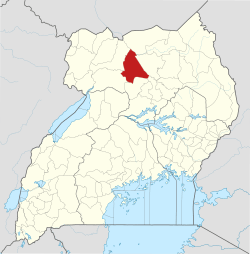Gulu Regional Cancer Centre
Gulu Regional Cancer Centre (GRCC) is a planned public, specialized, tertiary care medical facility owned by the Uganda Ministry of Health, intended to provide care for cancer patients in the Northern Region of Uganda.[1]
| Gulu Regional Cancer Centre | |
|---|---|
| Uganda Ministry of Health | |
| Geography | |
| Location | Gulu, Northern Region, Uganda |
| Organisation | |
| Care system | Public |
| Type | Cancer Treatment, Research and Teaching |
| Affiliated university | Gulu University School of Medicine |
| History | |
| Opened | July 1, 2019 |
| Links | |
| Other links | List of hospitals in Uganda |
Location
Initially, the facility is expected to be stationed within Gulu Regional Referral Hospital, who will be responsible for its daily operations.[2]
Later, a permanent building to house the cancer centre is expected to be constructed outside of the referral hospital. Initially, the space formerly occupied by Gulu Central Police Station was proposed.[2] However in 2017, when Gulu District failed to secure enough land to accommodate a stand-alone facility, the request for land was forwarded to Omoro District, to the south of Gulu District. Omoro District authorities allocated 4 acres (2 ha) at the Koro sub-county headquarters for the purpose of housing the cancer centre.[3]
Overview
GRCC is a cancer treatment, research, and teaching center, affiliated with the Gulu University School of Medicine and with the Gulu Regional Referral Hospital, the teaching hospital for the medical school. GRCC is expected to become functional in the financial year 2019/2020, which starts on 1 July 2019.[4]
The establishment of the centre was informed by the increased patient burden at Uganda Cancer Institute, in Kampala, the country's capital city, where 4,500 to 6,000 new cancer patients are registered annually. As of May 2016, approximately 60,000 new cancer patients are diagnosed annually in Uganda. Of these, an estimated 47,000 (78.3 percent) cancer patients die of their disease within one year, partly due to "late diagnosis and inappropriate treatment".[3][5]
Other regional cancer centers established in this effort include Arua Regional Cancer Centre, Mbarara Regional Cancer Centre and Mbale Regional Cancer Centre.[5]
In 2017, the government of Uganda borrowed €100 million (USh390 billion at that time), from the government of Austria to construct the four afore-mentioned cancer centres.[3]
Collaboration
The cancer centre works in collaboration with Uganda Cancer Institute (UCI), the leading cancer treatment and research institute in Uganda, which is under transformation into the East African Cancer Centre of Excellence.[6] UCI specialists work together with Gulu Regional Referral Hospital staff to provide the necessary oncology care.[7]
See also
- Hospitals in Uganda
References
- Paul Ampurire (30 July 2018). "Cancer Institute To Extend Radiotherapy Services To Mbarara, Gulu". Kampala: SoftPower Uganda. Retrieved 1 February 2019.
- Tumwesige, Arnest (18 October 2015). "Gulu Hospital to get cancer institute". New Vision. Kampala. Retrieved 1 February 2019.
- Emmy Daniel Ojara, and Patrick Uma (23 November 2017). "Govt Secures Land for Cancer Treatment Centre in Omoro". Kampala: Uganda Radio Network. Retrieved 1 February 2019.
- Wandawa, Vicky (1 February 2019). "Over 21,000 cancer deaths registered in 2018". New Vision. Kampala. Retrieved 1 February 2019.
- Ainebyoona, Emmanuel (10 May 2016). "Government to build regional cancer centres". Daily Monitor. Kampala. Retrieved 1 February 2019.
- Nabatanzi, Violet (17 March 2018). "MoH awards Prof. Kayanja, Wilson for fighting cancer". New Vision. Kampala. Retrieved 1 February 2019.
- Nabatanzi, Violet (5 March 2018). "Govt to establish cancer centres in Gulu and Mbale". New Vision. Kampala. Retrieved 1 February 2019.
External links
- Gulu's Only Cancer Treatment Centre Shuts Down As of 3 July 2012.
- Uganda - Gulu Cancer Registry
